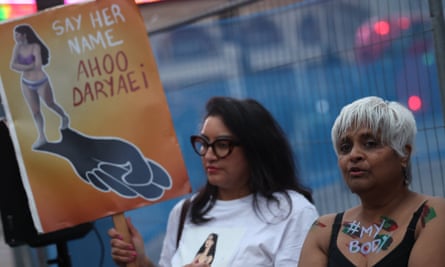Women in Iran could face the death sentence or up to 15 years in prison if they defy new compulsory morality laws due to come into effect this week.
New laws promoting the “culture of chastity and hijab” passed by the Iranian authorities earlier this month impose severe penalties for those caught “promoting nudity, indecency, unveiling or improper dressing”, including fines of up to £12,500, flogging and prison sentences ranging from five to 15 years for repeat offenders.
Article 37 of the new law also stipulates that those promoting or propagating indecency, unveiling or “bad dressing” to foreign entities, including international media and civil society organisations, could face a decade in prison and up to £12,500 in fines.
Those whose conduct is considered by the authorities to amount to “corruption on Earth” could be sentenced to death under article 296 of Iran’s Islamic penal code.
Amnesty International said this legal provision in effect meant that women and girls sending videos of themselves unveiled to media outside Iran or “otherwise engaging in peaceful activism” may be sentenced to death.
The human rights group said the law also appeared to provide immunity for anyone who wanted to carry out their “religious duty” and enforce compulsory veiling on women. Anyone intervening or attempting to stop the arrest or harassment of woman and girls defying compulsory veiling could themselves be imprisoned or fined under article 60 of the new law.

Any businesses or commercial establishments, taxi drivers, media and broadcasters, and educational institutions will also now be subjected to punishments and penalties if they fail to report defaulting women and men, or allow the promotion of “nudity” and “improper dressing”.
Diana Eltahawy, Amnesty’s deputy director for the Middle East, said: “This shameful law intensifies the persecution of women and girls for daring to stand up for their rights following the Woman, Life, Freedom uprising.
“The authorities are seeking to entrench the already suffocating system of repression against women and girls while making their daily lives even more intolerable,” she said.
Iranian journalists, activists, clerics and human rights lawyers have expressed outrage over the law, which they say will legitimise the increasing restrictions on women in the country.
Saeid Dehghan, a human rights lawyer at the Parsi Law Collective, said: “Nearly all provisions of this law contravene fundamental principles, such as article 9 of the Iranian constitution, which prohibits legislation that undermines citizens’ freedoms even in the name of national sovereignty.
“The [new] law stipulates lengthy prison sentences for those persistently opposing mandatory hijab and encouraging others to do the same. Citizens opposing mandatory hijab face punishments, such as long imprisonment or even execution, which are grossly disproportionate to their actions.”
The law came into place two years after nationwide protests rocked the country after the death in custody of Mahsa Amini, a 22-year-old Kurdish woman, for not wearing her hijab correctly.
Over the past two years, Iranian women have been publicly defying the strict dress code. Last month, videos of a young Iranian student stripping to her underwear, reportedly in protest at the strict dress code, went viral across social media. She was later taken to an undisclosed psychiatric hospital in the capital.
The authorities have since announced their intention of setting up “hijab clinics” to treat women defying the law, sparking further outrage.
Nazanin Afshin-Jam MacKay, an Iranian human rights advocate, said the law signalled a radical crackdown on women’s rights and freedoms by an “oppressive, gender-apartheid regime”.
She said: “In the last 45 years women have been subjected to fines, imprisonment and flogging for improper hijab but never have we seen written into law the possibility of an execution decree attached to such a ‘crime’.”
“Without international pressure, this regime will continue its campaign to crush women’s rights, as we’ve seen happen under the Taliban in Afghanistan – first restricting education, then silencing women entirely, even in spaces meant solely for women.”
Speaking anonymously to the Guardian, women in Iran said the new laws were part of an ongoing assault on their ability to choose how to live their lives.
One 23-year-old woman who took part in the Woman, Life, Freedom protests in September 2022, said: “We are being harassed, detained, fined and our cars are being confiscated already. I have received several SMS [text messages] with fines over driving without a hijab. They’ve already killed Mahsa anyway and, by now making it into law, they’re simply legalising the killing.”
Iran’s president, Masoud Pezeshkian, has stated his opposition to the new laws in a media interview, where he warned that its enforcement would lead to further discontent in Iranian society.

.png) 1 month ago
12
1 month ago
12













































